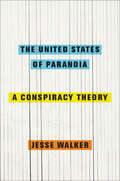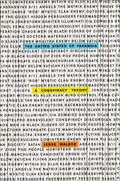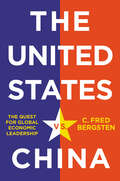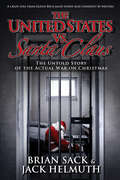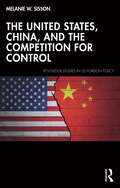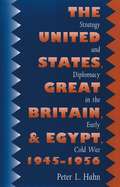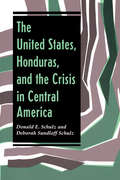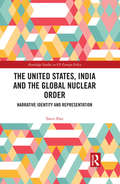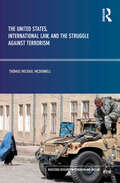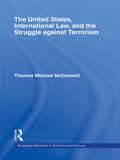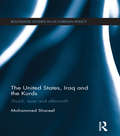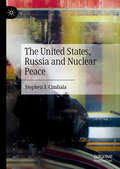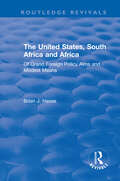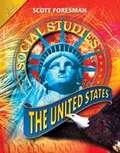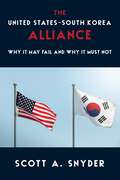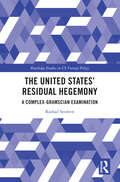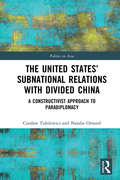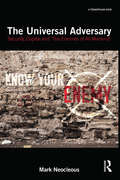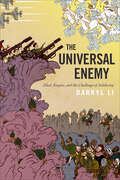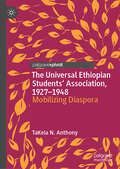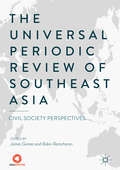- Table View
- List View
The United States of Paranoia: A Conspiracy Theory
by Jesse Walker“A superb analysis of American paranoia . . . a terrific, measured, objective study of one of American culture’s most loaded topics.” —Publishers Weekly (starred review)Jesse Walker’s The United States of Paranoia presents a comprehensive history of conspiracy theories in American culture and politics, from the colonial era to the War on Terror.The fear of intrigue and subversion doesn’t exist only on the fringes of society, but has always been part of our national identity. When such tales takes hold, Walker argues, they reflect the anxieties and experiences of the people who believe them, even if they say nothing true about the objects of the theories themselves.With intensive research and a deadpan sense of humor, Jesse Walker’s The United States of Paranoia combines the rigor of real history with the punch of pulp fiction.This edition includes primary-source documentation in the form of archival photographs, cartoons, and film stills selected by the author.“Oddly entertaining . . . Walker quickly demolishes [Richard Hofstadter’s The Paranoid Style in American Politics]. It’s all too rare to come upon a writer willing to attack the sacred cows of the right and left with equal amounts of intelligence and flair.” —Los Angeles Times“Free-floating fear and half-baked ideas about what’s really going on have been a more significant part of American history than is generally accepted, according to Jesse Walker’s thorough, meticulously researched book.”—Vice“A remarkably comprehensive, wide-ranging look at the way American culture, politics, religion, and social structure have been affected by conspiracy stories.” —Booklist
The United States of Paranoia: A Conspiracy Theory
by Jesse Walker“A superb analysis of American paranoia . . . a terrific, measured, objective study of one of American culture’s most loaded topics.” —Publishers Weekly (starred review)Conspiracies have been woven through America’s social tapestry since the beginning of its history. The United States of Paranoia is a unique and fascinating look at how these commonly held beliefs—true or not—have helped shape the American cultural imagination. Using examples from colonial times to today, Jesse Walker makes the compelling argument that paranoia doesn’t just exist on the fringe of society, but is at the core of our national identity.Walker doesn’t focus on proving or disproving a particular theory. Synthesizing intensive archival research in a pulp fiction narrative, he explores the myths that haunt our nation, breaking them into five distinct categories: The Enemy Outside, The Enemy Within, The Enemy Above, The Enemy Below, and The Benevolent Conspiracy. From J. Edgar Hoover’s FBI to Watergate, the “Matrix” phenomenon to the Birthers, Walker reveals how national myths have influenced our lives, including our view of ourselves and our government. He also identifies and explores the little-recognized rise of a subculture obsessed not with one single myth or another, but in the notion of the conspiracy phenomenon itself. This growing obsession, Walker attests, offers profound insight into what it means to be American.“Free-floating fear and half-baked ideas about what’s really going on have been a more significant part of American history than is generally accepted, according to Jesse Walker’s thorough, meticulously researched book.”—Vice“A remarkably comprehensive, wide-ranging look at the way American culture, politics, religion, and social structure have been affected by conspiracy stories.” —Booklist
The United States vs. China: The Quest for Global Economic Leadership
by C. Fred BergstenAfter leading the world economy for a century, the United States faces the first real challenge to its supremacy in the rise of China. Is economic (or broader) conflict, well beyond the trade and technology war that has already erupted, inevitable between the world’s two superpowers? Will their clash produce a new economic leadership vacuum akin to the 1930s, when Great Britain was unable to play its traditional leadership role and a rising United States was unwilling to step in to save the global order? In this sweeping and authoritative analysis of the competition for global economic leadership between China and the United States, C. Fred Bergsten warns of the disastrous consequences of hostile confrontation between these two superpowers. He paints a frightening picture of a world economy adopting Chinese characteristics, in which the United States, after Trump abdicated much of its role, engages in a self-defeating attempt to “decouple” from its rival. Drawing on more than 50 years of active participation as a policymaker and close observation as a scholar, Bergsten calls on China to exercise constructive global leadership in its own self-interest and on the United States to reject a policy of containment, avoid a new Cold War, and instead pursue “conditional competitive cooperation” to work with its allies, and especially China, to lead, rather than destroy, the world economy.
The United States vs. Santa Claus: The Untold Story of the Actual War on Christmas
by Brian Sack Jack HelmuthThe comedic minds behind TheBlaze TV's hit show The B.S. of A. with Brian Sack bring you a hilarious illustrated account about the government's never-ending war on Christmas.'Twas right before ChristmasAnd in the White HouseA dread plan was hatchedTo make Santa a louseJoe Biden assisted, and Mike Bloomberg tooAnd before we all knew it, old Saint Nick was through.The comedic minds behind TheBlaze TV's hit show, The B.S. of A. with Brian Sack bring you their hilarious vision of Christmas Future--or possibly sooner.What happens when the Scrooge-iest Washington politicians take on the jolliest soul of all time? Can a scandal-plagued administration distract the American public by bringing Santa to his knees? Can a bumbling bureaucracy destroy the reputation of the most popular man in the Northern Hemisphere? Spoiler alert: YES! And faster than you can say ho-ho-ho! This is the sad story of the real war on Christmas--and how the NSA, IRS, OSHA and every other acronym in Washington came gunning for the man in red with everything they've got: two-thousand page reports on the environmental impact of reindeer farts...unionized elves...suspicious audits...character assassination...and all the other cruel and unusual tactics of an out-of-control government. Yes Virginia, there was a Santa Claus. This is his story.
The United States, China, and the Competition for Control (Routledge Studies in US Foreign Policy)
by Melanie W. SissonThis book considers whether the United States and the People’s Republic of China have irreconcilable visions of world order.The United States, China, and the Competition for Control evaluates the twin claims that China seeks to dismantle the post–World War II international order and that the United States seeks to defend it. It defines the post–war order and examines how the United States and China have behaved within and in relation to it since 1945. An analysis of the two states’ rhetoric and policy reveals that their preferences for international order are not as divergent as today’s conventional wisdom suggests. The book therefore concludes that U.S. policies that treat China as a threat to international order are misplaced and offers policy recommendations for how the United States can both preserve the post–war order and protect its vital national interests.The book will be of interest to foreign policy practitioners, commentators, and analysts as well as students and scholars of security studies, international relations, and geopolitics.
The United States, Great Britain, and Egypt, 1945-1956
by Peter L. HahnEgypt figured prominently in United States policy in the Middle East after World War II because of its strategic, political, and economic importance. Peter Hahn explores the triangular relationship between the United States, Great Britain, and Egypt in order to analyze the justifications and implications of American policy in the region and within the context of a broader Cold War strategy.This work is the first comprehensive scholarly account of relations between those countries during this period. Hahn shows how the United States sought to establish stability in Egypt and the Middle East to preserve Western interests, deny the resources of the region to the Soviet Union, and prevent the outbreak of war. He demonstrates that American officials' desire to recognize Egyptian nationalistic aspirations was constrained by their strategic imperatives in the Middle East and by the demands of the Anglo-American alliance.Using many recently declassified American and British political and military documents, Hahn offers a comprehensive view of the intricacies of alliance diplomacy and multilateral relations. He sketches the United States' growing involvement in Egyptian affairs and its accumulation of commitments to Middle East security and stability and shows that these events paralleled the decline of British influence in the region.Hahn identifies the individuals and agencies that formulated American policy toward Egypt and discusses the influence of domestic and international issues on the direction of policy. He also explains and analyzes the tactics devised by American officials to advance their interests in Egypt, judging their soundness and success.
The United States, Honduras, And The Crisis In Central America (Thematic Studies In Latin America Ser.)
by Deborah Sundloff SchulzPrior to the 1980s Honduras was an obscure backwater, of little public or policy concern in the United States. With the advent of the Reagan administration, however, Honduras became a launching pad for the administration's contra was against the Sandinista government in Nicaragua and for counterinsurgency operations in El Salvador. Placing events in the context of Honduran history, the authors provide a fascinating account of Honduran domestic politics and of the personalities, motives, and maneuvers of policymakers on both sides of the U.S.-Honduras relationship-- too often a tale of intrigue, violence, and corruption.
The United States, India and the Global Nuclear Order: Narrative Identity and Representation (Routledge Studies in US Foreign Policy)
by Tanvi PateIn the Post-Cold War era, US nuclear foreign policies towards India witnessed a major turnaround as a demand for ‘cap, reduce, eliminate’ under the Clinton administration was replaced by the implementation of the historic ‘civil nuclear deal’ in 2008 by Bush, a policy which continued under Obama’s administration. This book addresses the change in US nuclear foreign policy by focusing on three core categories of identity, inequality, and great power narratives. Building upon the theoretical paradigm of critical constructivism, the concept of the ‘state’ is problematised by focusing on identity-related questions arguing that the ‘state’ becomes a constructed entity standing as valid only within relations of identity and difference. Focusing on postcolonial principles, Pate argues that imperialism as an organising principle of identity/difference enables us to understand how difference was maintained in unequal terms through US nuclear foreign policy. This manifested in five great power narratives constructed around peace and justice; India-Pakistan deterrence; democracy; economic progress; and scientific development. Identities of ‘race’, ‘political economy’, and ‘gender’, in terms of ‘radical otherness’ and ‘otherness’ were recurrently utilised through these narratives to maintain a difference enabling the respective administrations to maintain ‘US’ identity as a progressive and developed western nation, intrinsically justifying the US role as an arbiter of the global nuclear order. A useful work for scholars researching identity construction and US foreign and security policies, US-India bilateral nuclear relations, South Asian nuclear politics, critical security, and postcolonial studies.
The United States, International Law and the Struggle against Terrorism
by Thomas McDonnellThis book discusses the critical legal issues raised by the US responses to the terrorist threat, analyzing the actions taken by the Bush administration during the so-called "war on terrorism" and their compliance with international law. Thomas McDonnell highlights specific topics of legal interest including torture, extra-judicial detentions and the invasions of Afghanistan and Iraq, and examines them against the backdrop of terrorist movements which have plagued Britain and Russia. The book extrapolates from the actions of the USA, going on to look at the difficulties all modern democracies face in trying to combat international terrorism. This book demonstrates why current counter-terrorism practices and policies should be rejected, and new policies adopted that are compatible with international law. Written for students of law, academics and policy-makers, the volume demonstrates the dangers that breaking international law carries in the "war on terrorism".
The United States, International Law, and the Struggle against Terrorism (Routledge Research in Terrorism and the Law)
by Thomas McDonnellThis book discusses the critical legal issues raised by the US responses to the terrorist threat, analyzing the actions taken by the Bush administration during the so-called "War on Terrorism" and their compliance with international law. Thomas McDonnell highlights specific topics of legal interest including torture, extra-judicial detentions and the invasions of Afghanistan and Iraq, and examines them against the backdrop of terrorist movements which have plagued Britain and Russia. The book extrapolates from the actions of the USA, going on to look at the difficulties all modern democracies face in trying to combat international terrorism. This book demonstrates why current counter-terrorism practices and policies should be rejected, and new policies adopted that are compatible with international law. Written for students of law, academics and policy-makers, the volume demonstrates the dangers that breaking international law carries in the "War on Terrorism".
The United States, Iraq and the Kurds: Shock, Awe and Aftermath (Routledge Studies in US Foreign Policy)
by Mohammed ShareefThis book provides a descriptive and analytical narrative of the evolution of US foreign policy towards Iraq at the supra-national (global), national (Arab Iraq) and sub-national (Iraqi Kurdistan) levels. The book is unique in that it presents a sophisticated insight into the two major components of US Iraq policy. To achieve this, it addresses US foreign policy towards both Arab Iraq and an entirely original analysis on US policy towards the Iraqi Kurds as components of a larger US Iraq policy, dictated by the supreme US Grand Strategy. The book also examines whether US foreign policy towards Iraq has been one of continuity or change – a dimension that has not been illustrated in any other publication. The book deals intelligently and at great length with the events surrounding US Iraq policy in three distinct phases, going back to, 1979 with regard to Arab Iraq, and 1961 in respect to the Kurdish liberation movement, covering all subsequent US administrations including the Obama presidency. It provides a thorough examination of US interests in Iraq and reasons for the 2003 invasion and its aftermath. It also engages with the intellectual roots of US foreign policy, presenting an intricate reaction of views, objectives and agendas. This work will be of interest to students and scholars of Middle East studies, US Foreign Policy and Security studies.
The United States, Israel, and the Search for International Order: Socializing States (Role Theory and International Relations)
by Cameron G. ThiesHow do emerging states become full, functioning members of the international system? In this book, Cameron G. Thies argues that new and emerging states are subject to socialization efforts by current member states, which guide them in locating their position in the international system. Thies develops a theoretical approach to understanding how states socialize each other into and out of different roles in the international system, such as regional power, ally, and peacekeeper. The concept of state socialization is developed using role theory, a middle-range theory developed in the interdisciplinary field of social psychology. This middle-range theory helps to flesh out the theoretical mechanisms often missing in grand theories like neorealism and constructivism. The result is a structural theory of international politics that also allows for the explanation of actual foreign policy behavior by states. The foreign policy histories of the U.S. and Israel are analyzed using this theoretical approach to show how international social pressure has affected the kinds of roles they have adopted throughout their histories, as well as the kinds of roles that they have not been allowed to adopt. By considering the effects of international socialization attempts on their foreign policy behavior, Thies shows the well-known cases of the U.S. and Israel in a new light. The United States, Israel, and the Search for International Order argues that the process by which states learn their appropriate roles and behaviors in the international social order is crucial to understanding international conflict and cooperation, which will be significant for those studying both theory and method in international relations, foreign policy, and diplomatic history.
The United States, It's Past, Purpose, and Promise
by Diane HartThe United States, It's Past, Purpose, and Promise by Diane Hart.
The United States, Italy and the Origins of Cold War
by Kaeten MistryThis international history of the origins and nature of 'cold war' offers the first systematic examination of the complex relationship between the United States and Italy, and of American debates about warfare in the years between World War II and the Korean War. Kaeten Mistry reveals how the defeat of the Marxist left in the 1948 Italian election was perceived as a victory for the United States amidst a 'war short of war', as defined by influential planner George Kennan, becoming an allegory for cold war in American minds. The book analyses how political warfare sought to employ covert operations, overt tactics and propaganda in a co-ordinated offensive against international communism. Charting the critical contribution of a broad network of local, religious, civic, labour, and business groups, Mistry reveals how the notion of a specific American success paved the way for a problematic future for US-Italian relations and American political warfare.
The United States, Russia and Nuclear Peace
by Stephen J. CimbalaThis book analyzes the United States and Russia’s nuclear arms control and deterrence relationships and how these countries must lead current and prospective efforts to support future nuclear arms control and nonproliferation. The second nuclear age, following the end of the Cold War and the demise of the Soviet Union, poses new challenges with respect to nuclear-strategic stability, deterrence and nonproliferation. The spread of nuclear weapons in Asia, and the potential for new nuclear weapons states in the Middle East, create new possible axes of conflict potentially stressful to the existing world order. Other uncertainties include the interest of major powers in developing a wider spectrum of nuclear weapons and delivery systems, possibly for use in limited nuclear wars, and the competitive technologies for antimissile defenses being developed and deployed by the United States and Russia. Other technology challenges, including the implications of cyberwar for nuclear deterrence and crisis management, are also considered. Political changes also matter. The early post-Cold War hopes for the emergence of a global pacific security community, excluding the possibility of major war, have been dashed by political conflict between Russia and NATO, by the roiled nature of American domestic politics with respect to international security, and by a more assertive and militarily competent China. Additionally, the study includes suggestions for both analysis and policy in order to prevent the renewed U.S.-Russian nuclear arms race and competition in new technologies. This volume would be ideal for graduate students, researchers, scholars and anyone who is interested in nuclear policy, international studies, and Russian politics.
The United States, South Africa and Africa: Of Grand Foreign Policy Aims and Modest Means (Routledge Revivals)
by Brian J. HesseThis title was first published in 2001. "Grand aims" refers to the overarching tenets and doctrines that prevailed in US and South African foreign policies towards Africa. This study argues that when modest means were imposed upon American and South African foreign policy-makers, they were often forced to devise new grand aims. Few in-depth resources exist with regard to United States and/or South African foreign policies towards Africa. Those that do are overwhelmingly pre- or early-1990s in focus. This analysis encompasses the years 1990 to mid-1998 and is intended to be relevant to a broad readership, including academics, students, Africanists, historians, political scientists, regional specialists and policy-makers in the public and private sectors on both sides of the Atlantic.
The United States: Social Studies (Fifth Grade)
by Scott ForesmanSocial Studies textbook for 5th Grade
The United States–South Korea Alliance: Why It May Fail and Why It Must Not (A Council on Foreign Relations Book)
by Scott A. SnyderThe alliance between the United States and South Korea has endured through seven decades of shifting regional and geopolitical security contexts. Yet it now faces challenges from within. Domestic political turmoil, including deepening political polarization and rising nationalism in both countries, has cast doubt on the alliance’s viability—with critical implications for the balance of power in East Asia.Scott A. Snyder provides an authoritative overview of the internal and external pressures on the U.S.–South Korea alliance and explores its future prospects. He argues that nationalist leaders’ accession to power could put past successes at risk and endanger the national security objectives of both countries. In the United States, “America first” nationalism favors self-interest over cooperation and portrays allies as burdens or even free riders. “Korea first” sentiments, in both progressive and conservative forms, present the U.S. military presence in South Korea as an obstacle to Korean reconciliation or a shackle on South Korea’s freedom of action. Snyder also examines North Korea’s attempts to influence South Korean domestic politics and how China’s growing strength has affected the dynamics of the alliance. He considers scenarios in which the U.S.–South Korea relationship weakens or crumbles, emphasizing the consequences for the region and the world. Drawing on this analysis, Snyder offers timely recommendations for stakeholders in both countries on how to preserve and strengthen the alliance.
The United States’ Residual Hegemony: A Complex-Gramscian Examination (Routledge Studies in US Foreign Policy)
by Rashad SeedeenThis book investigates the hegemony of the USA by examining the Obama, Trump and Biden administrations’ responses to major global crises. Combining a Gramscian framework with the main features of complexity theory it provides a comprehensive account of the systemic crisis of the hegemonic order of the United States in security, environmental, and economic issue-areas. By examining key case studies, the author reveals that the hegemonic responses of the US were confronted by overt challenges, including emerging state and non-state actors, globally complex transnational flows, and a combative domestic political climate which undermined the United States’ role in multilateral institutions no longer fit for purpose. This book will be of interest to general readers as well as scholars and students of US foreign policy, global politics, and Gramscian theory.
The United States’ Subnational Relations with Divided China: A Constructivist Approach to Paradiplomacy (Politics in Asia)
by Czeslaw Tubilewicz Natalie OmondThis book examines US subnational engagement in foreign relations, or paradiplomacy, with China and Taiwan from 1949 to 2020. As an alternative diplomatic history of the United States’ relations with divided China, it offers an in-depth chronological and thematic discussion of state and local communities’ responses to the China-Taiwan sovereignty conflict and their impact on US diplomacy. The book explains why paradiplomacy matters not only in the ‘low politics’ of economic and cultural cooperation, but also in the ‘high politics’ of diplomatic recognition. Presenting case studies of US states and cities developing policies towards divided China that paralleled, clashed or aligned with those pursued by federal agencies, it also identifies Chinese and Taiwanese objectives and strategies deployed when competing for US subnational ties. Conceptually, the book builds upon Constructivism, redefining paradiplomacy as an institutional fact, reflective of subnational identities and interests, rather than as a subnational pursuit of foreign markets, driven by objective economic forces. Featuring new empirical evidence and a novel conceptual framework for paradiplomacy, The United States’ Subnational Relations with Divided China will be a useful resource for students and scholars of US foreign policy, the politics of China and Taiwan, paradiplomacy and international relations.
The Universal Adversary: Security, Capital and 'The Enemies of All Mankind'
by Mark NeocleousThe history of bourgeois modernity is a history of the Enemy. This book is a radical exploration of an Enemy that has recently emerged from within security documents released by the US security state: the Universal Adversary. The Universal Adversary is now central to emergency planning in general and, more specifically, to security preparations for future attacks. But an attack from who, or what? This book – the first to appear on the topic – shows how the concept of the Universal Adversary draws on several key figures in the history of ideas, said to pose a threat to state power and capital accumulation. Within the Universal Adversary there lies the problem not just of the ‘terrorist’ but, more generally, of the ‘subversive’, and what the emergency planning documents refer to as the ‘disgruntled worker’. This reference reveals the conjoined power of the contemporary mobilisation of security and the defence of capital. But it also reveals much more. Taking the figure of the disgruntled worker as its starting point, the book introduces some of this worker’s close cousins – figures often regarded not simply as a threat to security and capital but as nothing less than the Enemy of all Mankind: the Zombie, the Devil and the Pirate. In situating these figures of enmity within debates about security and capital, the book engages an extraordinary variety of issues that now comprise a contemporary politics of security. From crowd control to contagion, from the witch-hunt to the apocalypse, from pigs to intellectual property, this book provides a compelling analysis of the ways in which security and capital are organized against nothing less than the ‘Enemies of all Mankind’.
The Universal Enemy: Jihad, Empire, and the Challenge of Solidarity (Stanford Studies in Middle Eastern and Islamic Societies and Cultures)
by Darryl LiNo contemporary figure is more demonized than the Islamist foreign fighter who wages jihad around the world. Spreading violence, disregarding national borders, and rejecting secular norms, so-called jihadists seem opposed to universalism itself. In a radical departure from conventional wisdom on the topic, The Universal Enemy argues that transnational jihadists are engaged in their own form of universalism: these fighters struggle to realize an Islamist vision directed at all of humanity, transcending racial and cultural difference. Anthropologist and attorney Darryl Li reconceptualizes jihad as armed transnational solidarity under conditions of American empire, revisiting a pivotal moment after the Cold War when ethnic cleansing in the Balkans dominated global headlines. Muslim volunteers came from distant lands to fight in Bosnia-Herzegovina alongside their co-religionists, offering themselves as an alternative to the US-led international community. Li highlights the parallels and overlaps between transnational jihads and other universalisms such as the War on Terror, United Nations peacekeeping, and socialist Non-Alignment. Developed from more than a decade of research with former fighters in a half-dozen countries, The Universal Enemy explores the relationship between jihad and American empire to shed critical light on both.
The Universal Ethiopian Students' Association, 1927–1948: Mobilizing Diaspora
by TaKeia N. AnthonyFrom 1927–1948, the Universal Ethiopian Students’ Association (UESA) mobilized the African diaspora to fight against imperialism and fascist Italy. Formed by a group of educated Africans, African-Americans, and West Indians based in Harlem and shaped by the ideals of Ethiopianism, communism, Pan-Africanism, Black Nationalism, Garveyism, and the New Negro Movement, the UESA sought to educate the diaspora about its glorious African past and advocate for anti-imperialism and independence. This book focuses on the UESA’s literary organ, The African, mapping a constellation of understudied activists and their contributions to the fight for Black liberation in the twentieth century.
The Universal Periodic Review of Southeast Asia: Civil Society Perspectives
by Robin Ramcharan James GomezThe research presented in this book provides a stakeholder analysis of human rights protection at a time when the region appears to be regressing into an insidious and deep authoritarianism. As political space shrinks in Southeast Asia, the book provides an insight into how civil society engaged with the Universal Periodic Review (UPR) of the United Nations Human Rights Council during the first (2008-2011) and second (2012-2016) cycles. Through evidence-based research, the authors in this volume identify gaps in human rights reporting and advocacy during the UPR, notably on civil and political issues such as the right to life, freedom of expression, freedom of religion and belief, extrajudicial killings, arbitrary detention and claims for greater autonomy. In short, The Universal Periodic Review of Southeast Asia: Civil Society Perspectives, highlights the need for more engagement on civil and political issues during the third cycle of the UPR in 2017-2020. Failing this, the UPR process risks being reduced to a platform where civil society only engages on issues that States are willing to cooperate on. If this is the case, Southeast Asia's democratic transition will suffer a long term set back.
